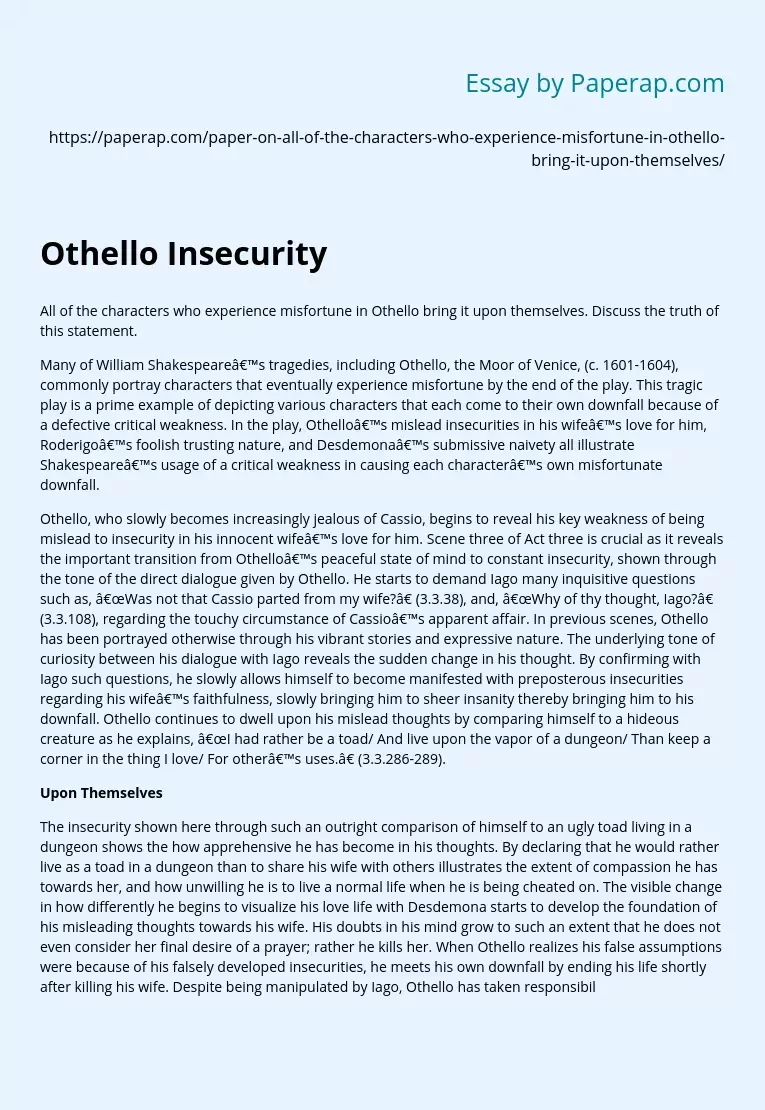Why Othello Characters Bring Misfortune upon Themselves
All of the characters who experience misfortune in Othello bring it upon themselves. Discuss the truth of this statement.
Many of William Shakespeare’s tragedies, including Othello, the Moor of Venice, (c. 1601-1604), commonly portray characters that eventually experience misfortune by the end of the play. This tragic play is a prime example of depicting various characters that each come to their own downfall because of a defective critical weakness. In the play, Othello’s misled insecurities in his wife’s love for him, Roderigo’s foolish trusting nature, and Desdemona’s submissive naivety all illustrate Shakespeare’s usage of a critical weakness in causing each character’s own misfortunate downfall.
Othello, who slowly becomes increasingly jealous of Cassio, begins to reveal his key weakness of misleading to insecurity in his innocent wife’s love for him. Scene three of Act three is crucial as it reveals the important transition from Othello’s peaceful state of mind to constant insecurity, shown through the tone of the direct dialogue given by Othello.
He starts to demand Iago many inquisitive questions such as, “Was not that Cassio parted from my wife?” (3.3.38), and, “Why of thy thought, Iago?” (3.3.108), regarding the touchy circumstance of Cassio’s apparent affair. In previous scenes, Othello has been portrayed otherwise through his vibrant stories and expressive nature. The underlying tone of curiosity between his dialogue with Iago reveals the sudden change in his thought. By confirming with Iago such questions, he slowly allows himself to become manifested with preposterous insecurities regarding his wife’s faithfulness, slowly bringing him to sheer insanity thereby bringing him to his downfall.
Othello continues to dwell upon his mislead thoughts by comparing himself to a hideous creature as he explains, “I had rather be a toad/ And live upon the vapor of a dungeon/ Than keep a corner in the thing I love/ For other’s uses.” (3.3.286-289).
The insecurity shown here through such an outright comparison of himself to an ugly toad living in a dungeon shows how apprehensive he has become in his thoughts. By declaring that he would rather live as a toad in a dungeon than to share his wife with others illustrates the extent of compassion he has towards her, and how unwilling he is to live a normal life when he is being cheated on. The visible change in how differently he begins to visualize his love life with Desdemona starts to develop the foundation of his misleading thoughts towards his wife. His doubts in his mind grow to such an extent that he does not even consider her final desire of a prayer; rather he kills her. When Othello realizes his false assumptions were because of his falsely developed insecurities, he meets his own downfall by ending his life shortly after killing his wife. Despite being manipulated by Iago, Othello has taken responsibility for his own actions, through his fatal weakness of being insecure in his wife’s love for him.
Why Othello Characters Bring Misfortune upon Themselves. (2019, Dec 05). Retrieved from https://paperap.com/paper-on-all-of-the-characters-who-experience-misfortune-in-othello-bring-it-upon-themselves/

